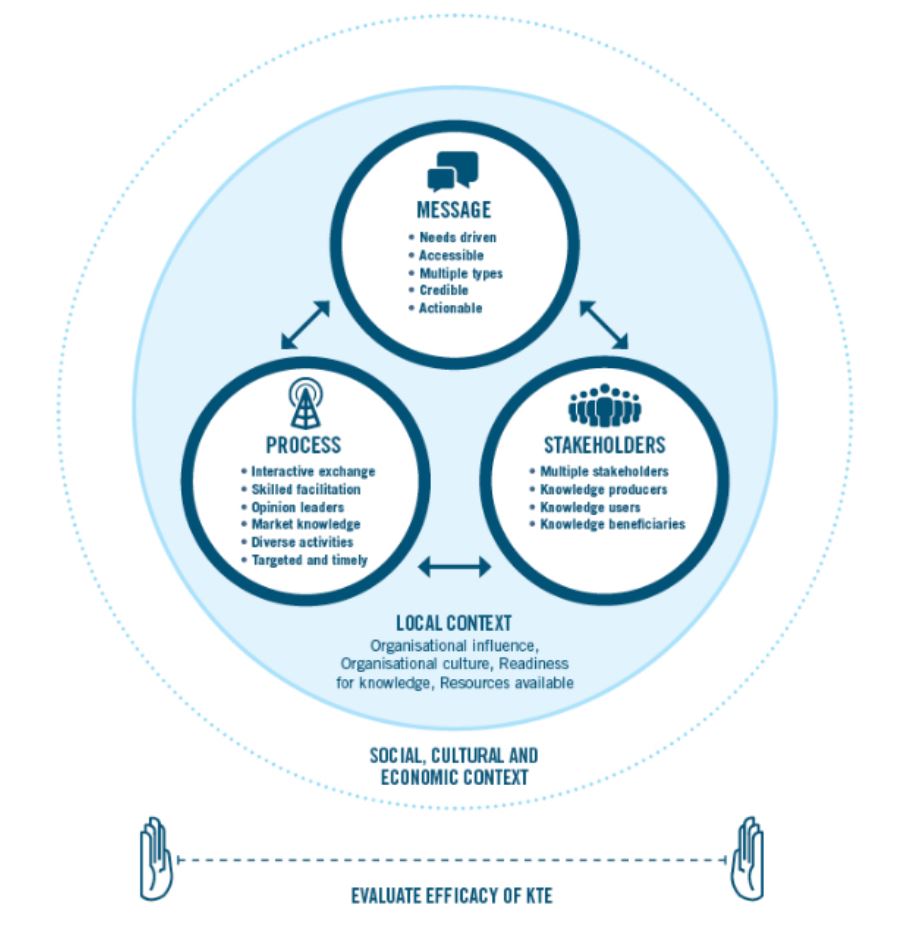EMTReK – Evidence-based Model for the Transfer and Exchange of Research Knowledge
D and/or I:
 The focus on dissemination and/or implementation activities. D-only focuses on an active approach of spreading evidence-based interventions to target audience via determined channels using planned strategies. D=I, D>I, and I>D means there is some focus on both dissemination and implementation. I-only focuses on process of putting to use or integrating evidence-based interventions within a setting.
The focus on dissemination and/or implementation activities. D-only focuses on an active approach of spreading evidence-based interventions to target audience via determined channels using planned strategies. D=I, D>I, and I>D means there is some focus on both dissemination and implementation. I-only focuses on process of putting to use or integrating evidence-based interventions within a setting.
D-Only Socio-Ecological Levels:
 The level of the framework at which the model operates. Individual includes personal characteristics; Organization includes hospitals, service organizations, and factories; Community includes local government and neighborhoods; System includes hospital systems and government; Policy includes changes in policy.
The level of the framework at which the model operates. Individual includes personal characteristics; Organization includes hospitals, service organizations, and factories; Community includes local government and neighborhoods; System includes hospital systems and government; Policy includes changes in policy.
- Individual
- Organization
- Community
- System
- Policy
Number of Times Cited:
 The # of times the original publication for the model was cited as indicated by Google Scholar since 2016.
The # of times the original publication for the model was cited as indicated by Google Scholar since 2016.
15 Field of Origin:
 The field of study in which the model originated.
The field of study in which the model originated.
Pallative Care Practitioner/Researcher:
 Whether the model is for the use of practitioners and/or researchers.
Whether the model is for the use of practitioners and/or researchers.
Researcher and Practioner Rating:
 These are ratings given by users of the site.
These are ratings given by users of the site.
Constructs:
 Name of the construct developed by classifying/aligning the elements abstracted from models.
Name of the construct developed by classifying/aligning the elements abstracted from models.
Assessment Instruments:
- AHRQ Digital Health Equity Framework
- CFIR Interview Guide (Lam)
- CFIR Interview Guide (Zhao)
- CFIR Interview Guide Webtool
- Clinical Sustainability Assessment Tool (CSAT)
- Context Matters Reporting Template
- Evidence Based Practice Attitude Scale (EBPAS)
- FRAME-IS Adaptation Tracking Instrument
- Glisson's Organizational Social Context (OSC)
- Hall's Levels of Use Scale
- Implementation Climate Scale (ICS)
- Implementation Leadership Scale (ILS)
- Implementation Strategy Usability Scale
- Intervention Scalability Assessment Tool (ISAT)
- Iterative, Practical, Robust Implementation and Sustainability Model (iPRISM) Webtool
- Local Wellness Policy Implementation Checklist
- Local Wellness Policy Survey
- Normalization Process Theory Interview Guide
- Normalization Process Theory Questionnaire (NoMAD)
- Organizational Readiness for Implementing Change (ORIC)
- PRISM Contextual Survey Instrument (PCSI)
- PRISM Interview Guide
- Partnership/Synergy Assessment Tool
- Policy Coalition Evaluation Tool (PCET)
- Program Sustainability Assessment Tool (PSAT)
- RAPICE Protocol, Activity, and Interview Prompt Guide
- RAPICE Summary Template
- Readiness Thinking Tool - Observation Guide
- Readiness Thinking Tool - Survey
- Readiness for Recovery and Resiliency - Interview Guide
- Rehabilitation Policy Questionnaire
- Research Engagement Survey Tool (REST)
- Research Engagement Survey Tool (REST) - 9 item
- Short Program Sustainability Assessment Tool (PSAT)
- Stages of Implementation Completion (SIC)
- i-PARiHS Interview Guide
Website:
 Website.
Website.
http://www.professionalpalliativehub.com/research/palliative-care-research-projects/developing-implementing-‘system’-structured-network-wide
Citations:
 The original publication(s) of the model.
The original publication(s) of the model.
Prihodova L, Guerin S, Kernohan WG. Knowledge transfer and exchange frameworks in health and their applicability to palliative care: scoping review protocol. J Adv Nurs. 2015 Jul;71(7):1717-25. doi: 10.1111/jan.12642. Epub 2015 Mar 5. PMID: 25739936. Examples:
 Citations of studies that have used the model as an outline for their study.
Citations of studies that have used the model as an outline for their study.
Payne C, Brown MJ, Guerin S, Kernohan WG. EMTReK: An Evidence-based Model for the Transfer & Exchange of Research Knowledge—Five Case Studies in Palliative Care. SAGE Open Nursing. January 2019. doi:10.1177/2377960819861854 There are no reviews yet. Be the first one to write one.
